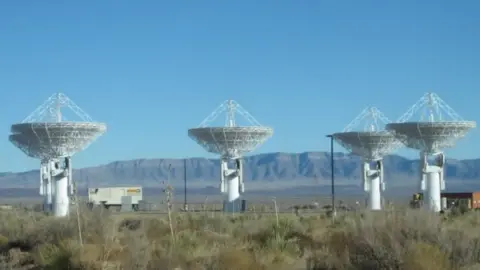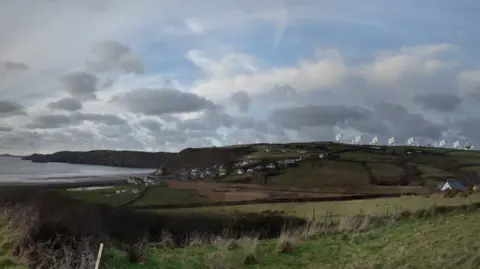Space radar plan by Pembrokeshire Coast path 'unacceptable'
Space radar plan near national park 'unacceptable'
20 hours ago
By Aled Scourfield, BBC News
US Space Force

An example array of US Space Force radars that can monitor activity in deep space
Plans to build 27 radar dishes overlooking the UK's only coastal national park are "unacceptable", campaigners say.
They want the UK government to scrap proposals to build a space radar installation at an old air force base on the tip of remote west Wales.
The dishes are taller than four London buses, and are capable of seeing a football in space.
Defence Secretary Grant Shapps said the system could help the UK protect itself from "space warfare".
But some residents fear building the Deep Space Advanced Radar Capability (DARC) site in Pembrokeshire would be damaging to the area.
The UK, US and Australia have signed a security pact and agreed to build a system which could identify potential "targets" up to 22,000 miles (36,000 km) away from Earth where many military satellites are positioned.
Mr Shapps said last year the system would be "constantly tracking threats".
Both the US and UK have accused Russia and China of developing weapons which could be used to take out satellites.

The first radar site will be built in Australia and is expected to be up and running by 2026, another will be built in the US while the UK site is earmarked for the Cawdor Barracks near St Davids and likely to be operational by 2030.
But the final decision depends on the outcome of an environmental impact assessment and a planning application to Pembrokeshire council.
Parc against Darc
Campaigners have made mock-up images, not to scale, of how the radar dishes might look on the landscape
A group of locals have launched a campaign against the plans for the site of the old RAF Brawdy - near the Pembrokeshire Coast National Park - which is now home to 14 Signal Regiment, the British Army's electronic warfare unit.
"If you stand on a headland in Solva, you can see Brawdy and you'll definitely be able to see the radar," said campaigner Roy Jones.
"They're 20 metres tall. St Davids is highly dependent on tourism. It's going to greatly affect the economy."
Mr Jones led a similar campaign at the end of the 1980s against different proposals for a radar station at Brawdy.

The plans were defeated after public meetings and rallies attended by thousands of anti-radar campaigners.
The Ministry of Defence (MoD) had previously said the new radar capability has the potential to make space "safer and more secure" amid growing concerns about congestion, competition and even an arms race in space.
The 14th Signals Regiment are due to relocate from Cawdor Barracks from 2028 and the MoD said building the radars at the site will provide 100 long-term jobs.
"It's a threat to the local community but it's also a threat to Wales and to the world," said Jill Evans of the campaign for nuclear disarmament in Wales.
"It's an attempt to control things happening in space and that's not something we want Wales to play a part in. We want to build Wales as a nation of peace. It's unacceptable."
The group will hold a public meeting later this month and are planning a number of peaceful protests against the plans.
The proposed 27 dishes would be 20m high by 15m wide and one councillor said he wants assurances from the MoD.

Getty Images
The proposed radar site will be above the village of Solva
"There must be no harm to human health so it must be safe," said Mark Carter, who represents the local Solva ward on Pembrokeshire council.
"I'd also want an assurance that local people would be prioritised to have these jobs and see how it affects the landscape.
"As long as I've lived here, there's been a military presence and it provides a benefit to the community. If we can keep an MoD presence here then hopefully, even if the army leave, something else will be done in the old barracks."
The proposed site is on one of the most western points of the UK mainland and the MoD had previously said the radar network would have "unique geographic positioning" for global monitoring and coverage.
It added the project would mark a "new phase" of a security arrangement between the UK, US and Australia - known as AUKUS.
Space warfare expert Dr Bleddyn Bowen said: "There are up to 9,000 satellites in space providing all sorts of economic and security services for us today.
"Whether you're having a pizza delivered or you're delivering a bomb to within less than a metre accuracy, they all rely on satellites.
"So having a better understanding of what's going on in space is really important."
The Conservatives have called for more information from the MoD about the plan while Plaid Cymru have said the project will have a "hugely negative impact" on the community. Labour have been asked for a comment.
Pembrokeshire council and the Pembrokeshire Coast National Park Authority declined to comment at this stage while the MoD couldn't comment because of the election.









































